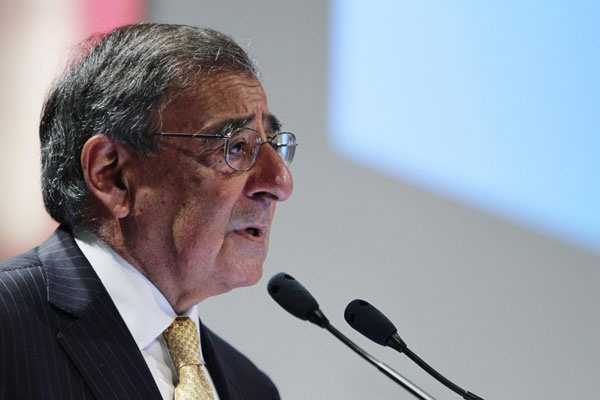US to improve strategic trust with China
Updated: 2012-06-02 16:03
(Xinhua)
|
||||||||
SINGAPORE - The United States will try to improve the strategic trust with China by strengthening military-to-military exchanges, while shifting some of its warships to the Pacific over the coming years, US Defense Secretary Leon Panetta said on Saturday.
|
 |
|
US Defense Secretary Leon Panetta speaks at the opening of the International Institute for Strategic Studies (IISS) 11th Asia Security Summit in Singapore June 2, 2012. [Photo/Agencies] |
Outlining details of the US plan for its "rebalancing" act towards Asia Pacific in a speech at the Shangri-La Dialogue, Panetta said the United States recognizes the importance of the relationship between the United States and China, not only between the militaries but also in diplomacy and the economic development.
"We are not naive about this relationship, and neither is China. We both understand the differences we have. We both understand the conflicts we have. But we also both understand that there really is no other alternative for both of us but to engage and to improve our communications and to improve our military-to-military relationships," he told defense ministers, senior defense officials and scholars at the multilateral forum.
Panetta said it is natural for the two countries to have ups and downs in the relations between their militaries. The United States is clear-eyed about the challenges but there will also be opportunities from closer relationship. The two countries have common challenges in areas like fighting piracy, too.
"I am personally committed to building a healthy, stable, reliable and continuous military-to-military relationship with China," he said.
Panetta said he might be visiting China later in the summer, and that he was hoping for visits by some of the US military commanders to China to help improve the communication in regard to what the United States is doing in the Pacific.
Panetta outlined some of the details of the US "rebalancing" plan in the speech at the Shangri-La Dialogue, saying that US military presence in the Pacific will also increase.
The number and sizes of the military exercises in the Pacific involving the United States will also increase, he said.
"By 2020, the Navy will re-posture its forces from today's roughly 50-50 percent split between the Pacific and the Atlantic to about a 60-40 split between those oceans. That will include six aircraft carriers, a majority of our cruisers, destroyers, littoral combat ships, and submarines," Panetta said.
The defense chief said the United States will make efforts to strengthen its partnerships with its allies and partner countries such as Indonesia, Malaysia, Vietnam and New Zealand.
Despite fiscal pressures, the United States is designing a strategy to maintain the strongest military in the world, which will be smaller, leaner but agile and more advanced technologically, he said. It will replace some of its older Navy ships with over 40 far more advanced ships over the next five years.
Panetta also urged restraint in the South China Sea disputes, saying that the United States is against provocation and that the disputes should be resolved through diplomatic efforts.
The Shangri-La Dialogue, or the 11th Asia Security Summit, is a multilateral forum organized by the London-based think tank International Institute for Strategic Studies. The participants also engage in diplomacy and exchange their views on issues and developments in regional security.
Panetta left Washington on Wednesday for a tour in the region that also includes stops in Vietnam and India.

 Relief reaches isolated village
Relief reaches isolated village
 Rainfall poses new threats to quake-hit region
Rainfall poses new threats to quake-hit region
 Funerals begin for Boston bombing victims
Funerals begin for Boston bombing victims
 Quake takeaway from China's Air Force
Quake takeaway from China's Air Force
 Obama celebrates young inventors at science fair
Obama celebrates young inventors at science fair
 Earth Day marked around the world
Earth Day marked around the world
 Volunteer team helping students find sense of normalcy
Volunteer team helping students find sense of normalcy
 Ethnic groups quick to join rescue efforts
Ethnic groups quick to join rescue efforts
Most Viewed
Editor's Picks

|

|

|

|

|

|
Today's Top News
Health new priority for quake zone
Xi meets US top military officer
Japan's boats driven out of Diaoyu
China mulls online shopping legislation
Bird flu death toll rises to 22
Putin appoints new ambassador to China
Japanese ships blocked from Diaoyu Islands
Inspired by Guan, more Chinese pick up golf
US Weekly

|

|







